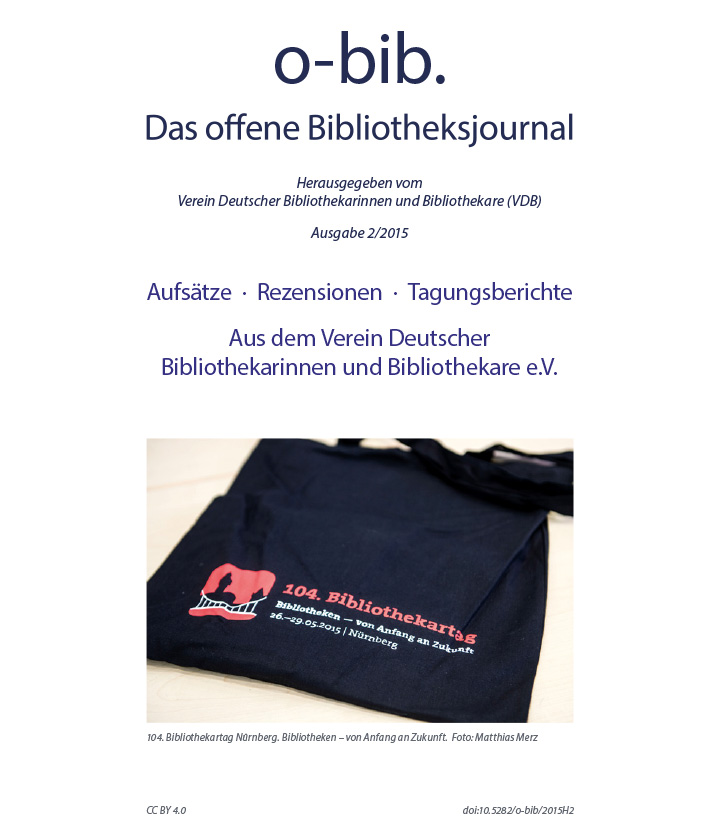Modernes Datenmanagement: Linked Open Data und die offene Bibliothek
DOI:
https://doi.org/10.5282/o-bib/2015H2S61-73Schlagwörter:
Datenmanagement, Linked Open Data, Openness, Offenheit, InfrastrukturAbstract
Bibliotheken stehen im Spannungsfeld zwischen sich verändernden Erwartungen der potentiellen Benutzer/innen, technologischem Wandel, Sparzwängen und steigenden Kosten für Inhalte und Infrastrukturen. Um fortzubestehen müssen sie sich neu erfinden. Eine Möglichkeit ist es, das Paradigma Offenheit auszufüllen, wonach u.a. die eigenen Kernprodukte entsprechend geltenden Webstandards für jeden frei zugänglich zur Verfügung gestellt werden. Um dies zu erreichen, müssen neue Infrastrukturen aufgebaut und neue Bündnisse eingegangen werden. Der Beitrag geht auf einen Vortrag auf dem Symposium Bibliotheks- und Informationsmanagement der Hochschule der Medien Stuttgart im Dezember 2014 zurück.
Libraries are entangled in a mesh of changing demands of potential users, technological advancement, budget cut downs and rising costs for content and infrastructure. In order to survive, they have to reinvent themselves. One option is to adopt the paradigm of openness. This means, among other things, offering the library’s core products free of charge to anyone who can make use of them. This can only be done by implementing new infrastructures and forging new alliances. The article
is based on a talk given at a symposium of library and information management in December 2014at the Hochschule der Medien at Stuttgart.
Literaturhinweise
- Breeding, Marshall: Library Systems Report. Operationalizing innovation. In: American
Libraries Magazine, Mai 2015, http://americanlibrariesmagazine.org/2015/05/01/library-systems-report/ (05.06.2015).
- Ceynowa, Klaus: Content ist king, context is queen. In: B.I.T. online 18 (2015), H. 2, S. 182-185, http://www.b-i-t-online.de/heft/2015-02-interview-ceynowa.pdf (05.06.2015).
– Clark, Nick: The great British library betrayal: Closures bring national network to brink of ‘absolute disaster’, reveals official inquiry. In: The Independent, 17. Dezember 2014,
– Deutsche Forschungsgemeinschaft, Ausschuss für Wissenschaftliche Bibliotheken und Informationssysteme: Die digitale Transformation weiter gestalten – Der Beitrag der
Deutschen Forschungsgemeinschaft zu einer innovativen Informationsinfrastruktur für die Forschung, Positionspapier der Deutschen Forschungsgemeinschaft, Bonn, 2012,
http://nbn-resolving.de/urn:nbn:de:hbz:5:2-60225 (05.06.2015).
– Gallagher, Sean: How Google and Microsoft taught search to „understand“ the Web. In: Ars Technica, 7. Juni 2012,
http://arstechnica.com/information-technology/2012/06/inside-the-architecture-ofgoogles-knowledge-graph-and-microsofts-satori/ (05.06.2015).
- Johnson, Larry, u. a.: NMC Horizon Report: 2014 Library Edition, Austin, Texas: The New Media Consortium, 2014,
http://cdn.nmc.org/media/2014-nmc-horizon-report-library-EN.pdf (05.06.2015).
– Lohmeier, Felix; Mittelbach, Jens: Offenheit statt Bündniszwang. In: Zeitschrift für Bibliothekswesen
und Bibliographie 61 (2014), H. 4/5, S. 209-214,
http://dx.doi.org/10.3196/1864295014614554; Pre-Print verfügbar unter
http://nbn-resolving.de/urn:nbn:de:bsz:14-qucosa-157772 (05.06.2015).
– Miller, Eric: Moving from MARC: How BIBFRAME moves the Linked Data in Libraries conversation to large-scale action. SWIB14, Bonn, 3. Dezember 2014, Abschn. Act 3: Visibility,
http://www.scivee.tv/node/63285 (05.06.2015).
– Mittelbach, Jens: Wissensexploration mit bibliothekarischen Daten: Ein EFRE-Projekt zur Entwicklung einer LOD-basierten Datenmanagement-Plattform, gehalten auf dem 103.
Deutscher Bibliothekartag, Bremen, 4. Juni 2014,
http://prezi.com/xgnkazs6f3ep/datenmanagement-plattform-der-slub-dresden/ (05.06.2015).
- Mittelbach, Jens; Glaß, Robert: A Library Data Management Platform Based on Linked Open Data, gehalten auf der SWIB14, Bonn, 2. Dezember 2014, https://speakerdeck.com/
swib14/a-library-data-management-platform-based-on-linked-open-data (05.06.2015).
- Morrison, Heather: Economics of scholarly communication in transition. In: First Monday 18 (2013), H. 6, http://dx.doi.org/10.5210/fm.v18i6.4370.
– Pohl, Adrian: Bibliotheken: Wir öffnen Daten. Zum Stand der Entwicklung einer offenen Dateninfrastruktur. In: o-bib 1 (2014), S. 45-55.
http://dx.doi.org/10.5282/o-bi/2014H1S45-55.
– Pohl, Adrian: Discovery Silos vs. the Open Web. Open Bibliography and Open Bibliographic Data, 23. Juni 2013,
http://openbiblio.net/2013/06/23/discovery-silos-vs-the-open-web/ (05.06.2015).
– van der Vaart, Lilian, u. a.: e-InfraNet: ‘Open’ as the default modus operandi for research and higher education, e-InfraNet, 2013, http://www.surf.nl/en/knowledge-and-innovation/knowledge-base/2013/policy-paper-e-infranet-open-as-the-default-modus-operandifor-research-and-higher-education.html (05.06.2015), S. 11.
- Wissenschaftsrat: Empfehlungen zur Zukunft des bibliothekarischen Verbundsystems in Deutschland, 28. Januar 2011, http://www.wissenschaftsrat.de/download/archiv/10463-11.pdf (05.06.2015).
Veröffentlicht
Ausgabe
Rubrik
Lizenz
Copyright (c) 2015 Jens Mittelbach

Dieses Werk steht unter der Lizenz Creative Commons Namensnennung 4.0 International.





